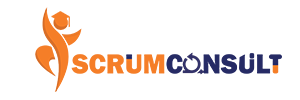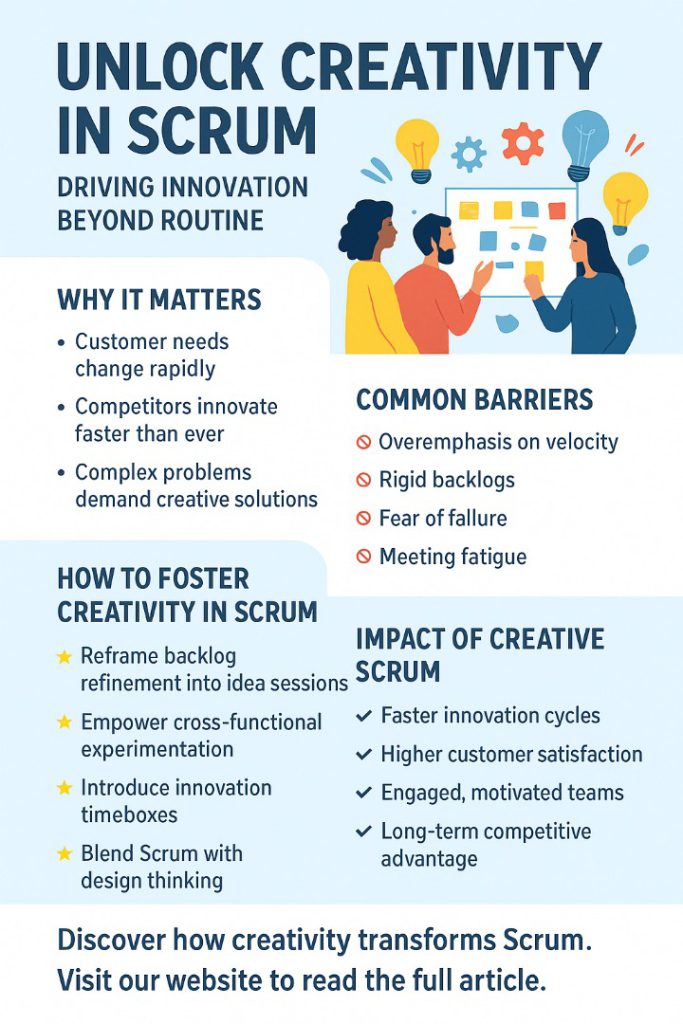In a world where technology, customer needs, and markets evolve at lightning speed, Scrum has become one of the most widely adopted agile frameworks because it provides structure, rhythm, and adaptability. But here’s the challenge: if teams treat Scrum as a rigid set of ceremonies, they risk falling into routine and losing the very creativity needed to solve today’s complex problems.
Scrum thrives when teams are not only efficient but also innovative. While Scrum provides a solid framework for iterative development, many teams find themselves stuck in routine delivery, lacking the space to generate truly innovative ideas. To stay ahead, organizations need to actively promote creativity and develop mechanisms to incorporate new ideas into their Scrum processes.
The skills you learn as a Scrum Master—facilitation, servant leadership, conflict resolution, adaptability—are highly valued across roles and industries. These skills open doors far beyond agile teams.
👉 Enroll today and take your career and your leadership to the next level with scrumconsult.com
The Importance of Creativity in Scrum
Scrum emphasizes transparency, inspection, and adaptation, which naturally facilitate incremental improvements. However, true innovation requires divergence—a willingness to explore uncharted territories, challenge assumptions, and experiment with novel approaches. Creativity leads to unique product features, optimized processes, and solutions that can redefine markets or deliver exceptional customer value.
Why Creativity Matters in Scrum
Creativity is often misunderstood as “artistic flair” or “thinking outside the box.” In a Scrum context, creativity means finding fresh ways to solve problems and deliver value.
Customer expectations are dynamic. What worked yesterday may not excite customers tomorrow.
Competition is fierce. Differentiation often comes from the ideas that no one else dared to test.
Complexity is the norm. Problems rarely have linear solutions; they require exploration, experimentation, and creative problem-solving.
Without creativity, Scrum teams risk becoming predictable, merely churning through backlogs instead of truly innovating.
Barriers to Creativity in Scrum Teams
Despite its promise, many Scrum teams struggle to foster creativity. Common barriers include:
Overemphasis on velocity – Prioritizing quantity over novelty.
Rigid backlogs – Fixed requirements leave little room for experimentation.
Fear of failure – Teams play it safe instead of exploring bold ideas.
Meeting fatigue – Poorly run ceremonies that stifle energy instead of sparking fresh thinking.
Recognizing these barriers is the first step toward building more creative Scrum practices.
How to Incorporate New Ideas into Scrum
Reframe Backlog Refinement as a Creative Space
Use refinement sessions for brainstorming multiple approaches before selecting the best option.
Empower Cross-Functional Experimentation
Encourage team members to step outside their usual roles. Fresh perspectives often spark innovation.
Introduce Creative Timeboxes
Dedicate short, focused time to exploration—mini “innovation spikes” that uncover breakthrough solutions.
Blend Agile with Design Thinking
Combine discovery sprints with delivery sprints to stay innovative while still executing effectively.
The Impact of Creativity in Scrum
When creativity is embedded into Scrum, organizations unlock:
Faster innovation cycles
Higher customer satisfaction
Engaged and motivated teams
Sustainable competitive differentiation
Scrum was designed as a lightweight framework for tackling complex problems. But complexity does not yield to routine—it demands curiosity, imagination, and courage. By deliberately weaving creativity into backlog refinement, sprint reviews, retrospectives, and day-to-day collaboration, Scrum becomes more than a process: it becomes a catalyst for innovation.
👉 The future of agile belongs to teams that balance discipline with imagination. Those who deliver not just increments of work, but fresh, valuable, and sometimes surprising solutions, will lead the way.
🌍 To learn more about Scrum Master Certification in Lagos, Agile Expert, Project Management, Product Owner, Lean Six-Sigma Green Belt, Lean Six-Sigma Black Belt, SMC, PSM, and CSM, kindly visit scrumconsult.com

